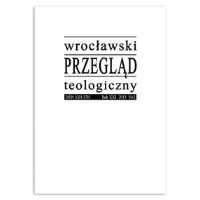Kulturkampf Na Obszarze Ołomunieckiego Komisariatu Arcybiskupiego Na Ziemi Głubczyckiej Z Siedzibą W Kietrzu (1871-1878)
Kulturkampf in the Territory of Olomouc Archbishop
Commissariat in Głubczyce County with Its Registered Office in Kietrz (1871-1878)
Author(s): Katarzyna MalerSubject(s): History of Church(es), Pastoral Theology
Published by: Papieski Wydział Teologiczny
Keywords: Church; Bishop's Commissioner; Catholic Centrum Party;
Summary/Abstract: At present, Głubczyce area covers Southern part of Opole Voivodeship. It Is bordered with the Czech Republic in the south and west. The territory was excluded from Poland for over .900 years, from 1038 (or 1039) to 1945. In the Church terms, up to 1945 the territory belonged to the Czech Olomouc diocese(from 1777 Olomouc archdiocese). After the First Prussian War in 1742 it was handed over from the power of the Austrian Habsburgs under control of Prussia. The newly established border separated Prussian Silesia from the Habsburg monarchy and divided Olomouc diocese into two parts. The bigger one, with the Capital in Olomouc, stayed within the Habsburg monarchy. The Smaller part, containing Głubczyce area, was assigned to the New Kingdom of Prussia. In this Prussian enclave of Olomouc bishopric, in 1751 Frederic II, the King of Prussia, initiated the foundation of Olomouc Bishop Commissioner With his registered office in Kietrz, Głubczyce County. The commissioner became the intermediary between Olomouc bishopric and the priesthood and believers of some deaneries in his area. He was also the intermediary between Olomouc bishopric and the governing bodies of Prussia. The Bishop Commissioner Served in most of the territory of Głubczyce county and in some parts of Racibórz county.Having introduced the Kulturkampf, in the years 1871-1878 Otto von Bismarck,the Chancellor of Germany, attempted to limit the influence of Catholic Church in German Reich. It also referred to the priesthood of Kietrz Archbishop Commissioner and Olomouc archbishop himself, who, residing outside Prussia in Habsburg monarchy, could not be punished by Prussian government for breaking anti-Church regulations anyway. On the other hand, many priests of Kietrz commissariat, as citizens of Prussia, were fined, and some of them were even imprisoned. Although the Kulturkampf was eventually cancelled,the Catholic Church in this area lost its influence in folk school system. However,the Church strengthened its position, also in politics, due to the Catholic Centrum Party growing in importance in Upper Silesia.
Journal: Wrocławski Przegląd Teologiczny
- Issue Year: 23/2015
- Issue No: 2
- Page Range: 255-268
- Page Count: 14
- Language: Polish

